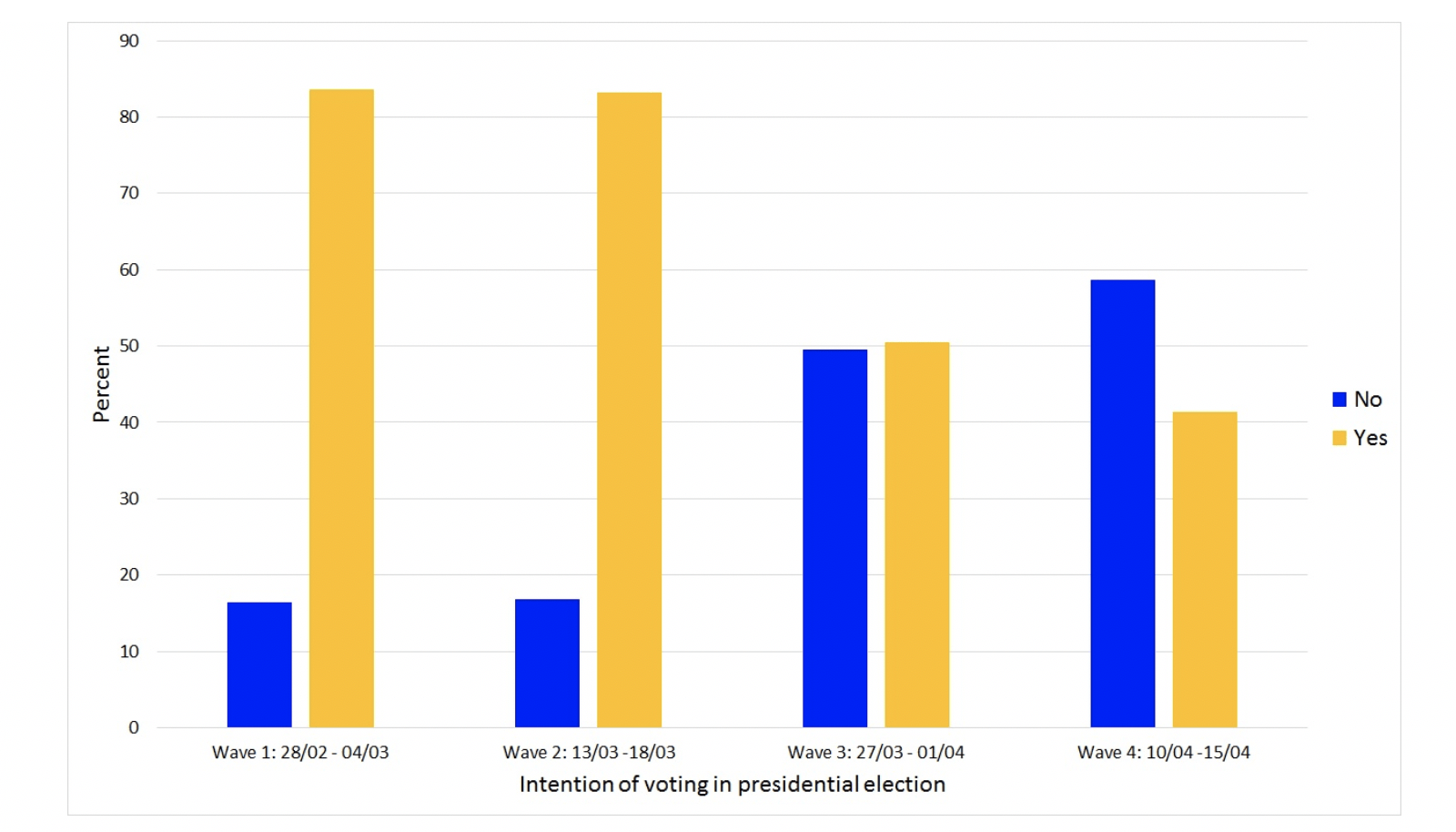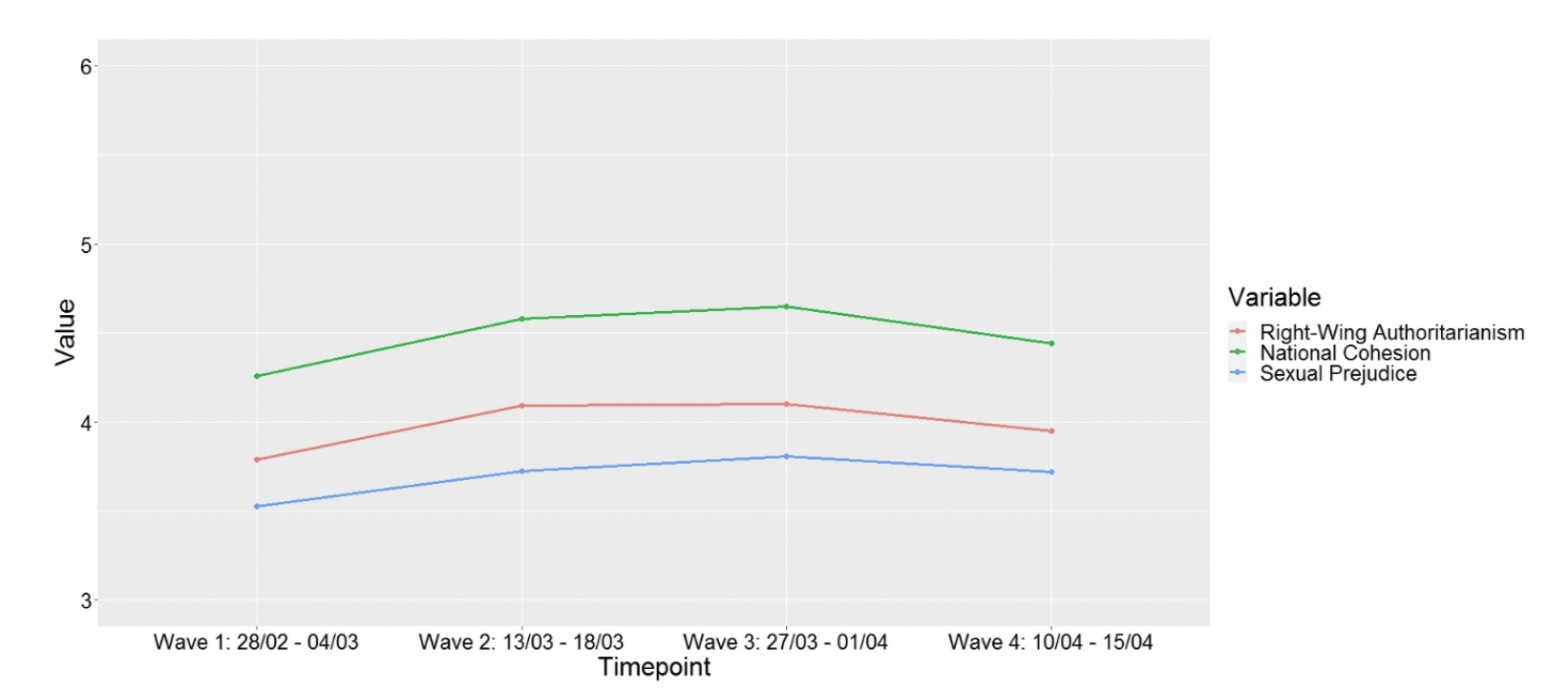Agnieszka Golec de Zavala & Oliver Keenan, PrejudiceLab, Goldsmiths, University of London
Agnieszka is head of the PrejudiceLab and Reader in the Psychology department at Goldsmith, University of London. She is a member of the AcademiaNet. The Portal for to Excellent Women Academics (http://www.academia-net.org) and has contributed to several diverse research areas, including psychological predictors of political conservatism, the role of motivated cognition in intergroup conflict, social identity, narcissism and collective narcissisms. Oliver completed his BSc (Hons) in Psychology and MSc in Psychology of Social Relations at Goldsmiths before starting his PhD under the guidance of Dr Golec de Zavala. His research will evaluate the role of collective narcissism in preference for certain forms of political leadership. He maintains wider interests in human well-being, peace and conflict.
With the global spread of coronavirus came a similarly disturbing spread of authoritarian power grabs made by right-wing populist leaders. This came in time with warnings that the pandemic provides a prime opportunity for authoritarian leaders to use emergency legislation to consolidate and extend their power. Notably, Hungary’s parliament voted to allow the incumbent Prime Minister Viktor Orbán to rule by decree—allowing executive powers to be concentrated under one party with a leader known for extreme illiberalism, these powers were endowed indefinitely. Policies which made attacks on civil liberties were introduced by populist leaders in countries such as the UK, Poland, Iran, the United States, China, and Israel.
It is well established within political psychology and political science that crises which increase perceptions of threat cause a ‘conservative shift’ within the population (Bonanno & Jost, 2006; Nail & McGreger, 2009). Populist leaders can exploit this shift in attitudes to their own ends. This increase in conservative attitudes is driven by increased motivation to manage feelings of uncertainty and threat—social hierarchy, order, and security take precedence over individual rights and freedoms (Hetherington & Suhay, 2011; Jost, Glaser, Kruglanski, & Sulloway, 2003). Individually, this is expressed by right-wing authoritarianism which involves commitment to traditional norms, willing obedience to the leader, and the endorsement of aggression against those who deviate from norms or break the rules. This allows for authoritarian governments to enact policies which will downgrade requirements of democracy such right to vote, freedom of speech, due legal process, and a lively electoral system (Hogg & Adelman, 2013; Kessler & Cohrs; 2008; Moghaddam, 2012).
Authoritarian governments dominate in regions with a high prevalence of infectious parasites (Murray, Schaller, & Suedfeld, 2013). Since pathogens (at least, until very recently) pose an inexplicable threat, human responses to their management have involved strict adherence to social norms relating to prevention of transmission. Experimental studies have also shown that exposing individuals to a threatening disease stimulus increased group conformity (Murray & Schaller, 2012). As this response plays out within nationalities, we can expect that this pandemic will increase concerns over national cohesion and an accentuation of national identity. This is in line with research that shows existential threats causes people to emphasise their collective group identity which meets basic human needs and provides feelings of safety and security (Smeekes & Verkuyten, 2013). This is represented by perceptions of national cohesion which involves seeing one’s group a tightly knit and highly similar, often at the cost of maintaining individuality (Waytz & Young, 2012).
Prejudice towards groups associated with the concept of contamination
This can have dangerous consequences for minority groups within the nationality, particularly those perceived as a threat to the established order. Too often, these are non-traditional women and sexual minorities, such as homosexuals and transsexuals. Prejudice towards these groups rely on the endorsement of cultural stigma associated with them—indeed, they make good targets for authoritarians as this cultural stigma has established such groups as posing threats of infection due to their sexual behaviour (Herek & McLemore, 2013; Tybur, Inbar, Güler, & Molho, 2015). Restrictions imposed on these groups are seen as necessary during times of ecological stress (Conway III et al., 2018; Varnum & Grossmann, 2016), though they are based on ideologies of hierarchy for the maintenance of power and control (Hodson, Choma, Boisvert, Hafer, MacInnis, & Costello, 2013; Morton, Postmes, Haslam, & Hornsey, 2009). Traditionally, gender-based hierarchy sanctions women’s sexual behaviour so they must act chaste (and so be perceived as nurturing, eliciting paternalistic and domineering aid and benevolence from men); if they display sexual autonomy, they elicit sexual objectification, promiscuity stereotypes, and hostility (Kahalon, Bareket, Vial, Sassenhagen, Becker, & Shnabel, 2019). Homosexuals and transsexuals are seen as threatening to the prevailing ‘heteronormativity’, which privileges heterosexual relationships (and their associations, such as, marriage and monogamy); deviations from this are seen as inferior and can elicit emotions of disgust and discrimination (Habarth, 2015; Ray & Parkhill, 2020).
Changes during 6 weeks of pandemics in Poland
These responses have been shown in real-time, with Poland and the United States extending or enacting attacks on women’s reproductive rights, and Hungary ceasing legal recognition of transsexuals’ gender identity. We have collected data assessing the relationships between authoritarianism, national cohesion and sexual prejudice as the pandemic has spread in Poland, and the government enacted lockdown measures. As a measure of sexual prejudice we assessed specific beliefs that non-traditional women and sexual minorities threaten national survival by not having children.
Data was collected at four times points over a six week period. The first data collection was carried out before the first coronavirus case was detected in Poland on March, 4th, 2020 (Wave 1: February, 28th to March 4th), then two weeks (Wave 2: March, 13th – March, 18th) four weeks (Wave 3: March, 27th – April, 1st) and six weeks (Wave 4: April 10th – April 15th ) into the pandemic. The first lock-down measures in Poland were introduced between 10th and 12th of March and were further strengthened on 25th of March (Krasuski, 2020; “Reuters”, 2020). The anti-abortion project came back onto the agenda on April, 7th , to be disused by the Polish Parliament on April, 16th instigating nationwide protests of women activists
Figure 1 shows the change in the willingness to participate in the presidential election should one take place next weekend. The huge increase in participants declaring their decision to boycott the presidential election occurred in wave 3. This followed the attempts made by the governing populist party to change the constitution to allow for presidential election to be carried out on May, 10th. Those changes were seen as unconstitutional and the drop in willingness to vote can be seen as an indicator of the populist government losing its appeal.

Figure 1. Intention to vote in potential upcoming presidential election
Similar changes can be seen in attitudes presented in Figure 2. Authorities and concerns with national cohesion increased in a linear fashion between waves 1 and 3. They were followed by the increase in sexual prejudice. Between wave 3 and 4 the populist government made an attempt to rally support turning against women. It brought into its agenda the issue of tightening anti-abortion law. The drop of authoritarianism, national cohesion and sexual prejudice in wave 4 suggest that this attempt backfired.

Figure 2. Change in social attitudes during the pandemic
What became apparent in our analyses was the change in the way in which people interpreted their nationality. Whereas strict adherence to traditional norms can make people feel safe, and maintaining hierarchy allows politicians and those on top to feel powerful and prestigious; it is not an effective form of social organization to allow for the widespread and collective acts of aid and kindness that are actually necessary in such crises (Drury, Reicher, & Stott, 2020; Kruglanski, 2020). This difference has been discussed in regards to attitudes of ‘Nationalism’, which is concerned with feelings of national superiority; in contrast to ‘Patriotism’ which relates to more critical feelings of wanting your country to be something to be proud of (Kosterman & Feshbach, 1989). What this data indicates is that some Polish citizens have turned away from the divisive narrative expounded by populist leaders, in favour of moral values that are concerned with collective responsibility and welfare (Janoff-Bulman & Carnes, 2013), as shown by increased defiance to government policy and a trend of ‘virtual protests’ against the abortion ban. Similar trends are found elsewhere, such as the trend of ‘caremongering’ in Canada, and the establishing of Covid-19 Mutual Aid groups in the UK. Indeed, psychological research indicates that cooperation and compassion is highly contagious between humans (Jordan, Rand, Arbesman, Fowler, & Christakis, 2013; Keltner, Kogan, Piff, & Saturn, 2014)—it might be the one bug worth catching.
Conclusion – a glimmer of hope
Our data shows that although right-wing authoritarianism, perceptions of national cohesion, and sexual prejudice increased during the opening weeks of the pandemic; they all showed decreases by the last point of measurement. This is matched with decreased intentions to vote, signalling disenchantment with the incumbent populist government. Worldwide, populist governments have mishandled and downplayed the pandemic for the sake of protecting their image and alternative interests. This has led to tragic increases in loss of life. The data suggests at a widespread realisation of this fact—despite all their rhetoric, populist leaders do not actually care about the people they claim to represent. Moreover, the crisis appears to engender a shift in values and people become less susceptible to divisive political messages. Ultimately, people can come to define national identity from a different framework: one that rejects black-and-white interpretations of the world and narrowly constructed notions of ‘insiders’ and ‘outsiders’; in its place, an emphasis on complex thinking, solidarity and cooperation.
References
Conway III, L. G., Bongard, K., Plaut, V., Gornick, L. J., Dodds, D. P., Giresi, T., … & Houck, S. C. (2017). Ecological origins of freedom: Pathogens, heat stress, and frontier topography predict more vertical but less horizontal governmental restriction. Personality and Social Psychology Bulletin, 43(10), 1378-1398.
Drury, J., Reicher, S., Stott, C. (2020, March 2020). From Me to We: in an Emergency, Collectivise to Survive. Novara Media. Retrieved from https://novaramedia.com/2020/03/22/from-me-to-we-in-an-emergency-collectivize-to-survive/
Habarth, J. M., Wickham, R. E., Holmes, K. M., Sandoval, M., & Balsam, K. F. (2019). Heteronormativity and women’s psychosocial functioning in heterosexual and same-sex couples. Psychology & Sexuality, 10(3), 185-199.
Herek, G. M., & McLemore, K. A. (2013). Sexual prejudice. Annual review of psychology, 64, 309-333.
Hodson, G., Choma, B. L., Boisvert, J., Hafer, C. L., MacInnis, C. C., & Costello, K. (2013). The role of intergroup disgust in predicting negative outgroup evaluations. Journal of Experimental Social Psychology, 49(2), 195-205.
Janoff-Bulman, R., & Carnes, N. C. (2013). Surveying the moral landscape: Moral motives and group-based moralities. Personality and Social Psychology Review, 17(3), 219-236.
Jordan, J. J., Rand, D. G., Arbesman, S., Fowler, J. H., & Christakis, N. A. (2013). Contagion of cooperation in static and fluid social networks. PloS one, 8(6).
Kahalon, R., Bareket, O., Vial, A. C., Sassenhagen, N., Becker, J. C., & Shnabel, N. (2019). The Madonna-whore dichotomy is associated with patriarchy endorsement: Evidence from Israel, the United States, and Germany. Psychology of Women Quarterly, 43(3), 348-367.
Keltner, D., Kogan, A., Piff, P. K., & Saturn, S. R. (2014). The sociocultural appraisals, values, and emotions (SAVE) framework of prosociality: Core processes from gene to meme. Annual review of psychology, 65, 425-460.
Kosterman, R., & Feshbach, S. (1989). Toward a measure of patriotic and nationalistic attitudes. Political psychology, 10(2), 257-274.
Morton, T. A., Postmes, T., Haslam, S. A., & Hornsey, M. J. (2009). Theorizing gender in the face of social change: Is there anything essential about essentialism?. Journal of personality and social psychology, 96(3), 653.
Ray, T. N., & Parkhill, M. R. (2020). Heteronormativity, Disgust Sensitivity, and Hostile Attitudes toward Gay Men: Potential Mechanisms to Maintain Social Hierarchies. Sex Roles, 1.
Smeekes, A., & Verkuyten, M. (2013). Collective self-continuity, group identification and in-group defense. Journal of Experimental Social Psychology, 49(6), 984-994.
Tybur, J. M., Inbar, Y., Güler, E., & Molho, C. (2015). Is the relationship between pathogen avoidance and ideological conservatism explained by sexual strategies?. Evolution and Human Behavior, 36(6), 489-497.
Varnum, M. E., & Grossmann, I. (2016). Pathogen prevalence is associated with cultural changes in gender equality. Nature Human Behaviour, 1(1), 1-4.

